It has often been charged … that Catholicism is overlaid with many pagan incrustations. Catholicism is ready to accept that accusation - and even to make it her boast…The great god Pan is not really dead, he is baptized. (Theodore Maynard, The Story of American Catholicism)
[Pan:] the nature-god, whence Pantheism; the god of shepherds, huntsmen, peasants, and dwellers on the land. Homer makes him the son of Hermes and Dryope. His name means ALL. He was the inventor of the Pandaean pipes; and no nymph who heard their sound could resist the fascination of the great Pan, his grotesque figure not withstanding. Pan is related to the Mendesian goat, only so far as the latter represents, as a talisman of great occult potency, nature’s creative force. The whole of the Hermetic philosophy is based on nature’s hidden secrets, and as Baphomet was undeniably a Kabbalistic talisman, so was the name of Pan of great magic efficiency in what Eliphas Levi would call the Conjuration of the Elementals. There is a well-known pious legend which has been current in the Christian world ever since the day of Tiberias, to the effect that the great Pan is dead. But people are greatly mistaken in this; neither nature nor any of her Forces can ever die. A few of these may be left unused, and being forgotten lie dormant for long centuries. But no sooner are the proper conditions furnished than they awake, to act again with tenfold power. (Helena Blavatsky, The Theosophical Glossary)
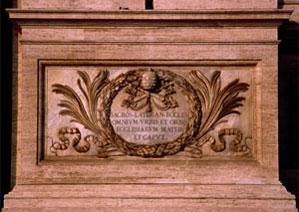 At the entrance of St. John Lateran Church in Rome there is a huge Latin inscription which reads, ‘SACROS LATERAN ECCLES OMNIVM VRBIS ET ORBIS ECCLESIARVM MATER ET CAPVT’ which translated into English reads: Sacred Lateran Church. Church mother and head of all the churches of the city and the world.
At the entrance of St. John Lateran Church in Rome there is a huge Latin inscription which reads, ‘SACROS LATERAN ECCLES OMNIVM VRBIS ET ORBIS ECCLESIARVM MATER ET CAPVT’ which translated into English reads: Sacred Lateran Church. Church mother and head of all the churches of the city and the world.
Babylon is described in Revelation 17 as the mother of harlots (apostate religious systems or churches), Mystery and the abominations of the earth. Obviously if God’s people are the chaste woman faithful to her husband, then Babylon is the opposite of this symbol or that system of worship which is unfaithful to God, and has a mystery religion and teaches and practices abominations. The harlot daughters of Rome must represent those churches that follow her false teachings and thus subject themselves to her rule, or even worse, officially accept the Roman leadership as authoritative.
And upon her forehead was a name written, MYSTERY, BABYLON THE GREAT, THE MOTHER OF HARLOTS AND ABOMINATIONS OF THE EARTH. (Revelation 17:5)
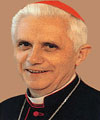 The Catechism of the Catholic Church (CCC) repeatedly refers to the Catholic Church as ‘Holy Mother Church.’ In September 2000 the Vatican issued a statement titled Dominus Iesus, where Cardinal Joseph Ratzinger stated:
The Catechism of the Catholic Church (CCC) repeatedly refers to the Catholic Church as ‘Holy Mother Church.’ In September 2000 the Vatican issued a statement titled Dominus Iesus, where Cardinal Joseph Ratzinger stated:
It must be always clear that the one, holy, catholic and apostolic universal church is not the sister, but the mother of all the churches.
The Washington Post reported on this church decree:
A new Vatican dictum issued today declares that individuals can attain full salvation from earthly sin only through the spiritual grace of the Catholic Church and that other faiths - including Protestant Christian ones - have defects that place their followers in a ‘gravely deficient situation’ in seeking salvation. The goal, according to a top Vatican official, is to combat the ‘so-called theology of religious pluralism,’ which suggests that Catholics are on a par in God’s eyes with, say, Jews, Muslims or Hindus.
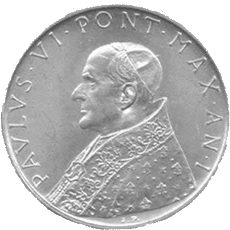
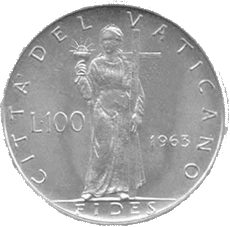 The word Vatican literally means Divining Serpent and is derived from Vatis (Diviner) and Can (Serpent). Vatican City and St. Peter’s Basilica were built on the ancient pagan site called in Latin vaticanus mons or vaticanus collis, which means hill or mountain of prophecy. Coins minted in Vatican City often bear the inscription CITTA DEL VATICANO, which means City of Prophecy. The Church of Rome thus applies the title of ‘City’ to its structure and as we shall see, lays claim to all the other attributes of Mystery Babylon as well. In the coin shown here, minted in 1963, Pope Paul VI is shown together with his title Pontifex Maximus. There is also a woman on the reverse side of the coin, and at her feet is her title, FIDES, which means faith.
The word Vatican literally means Divining Serpent and is derived from Vatis (Diviner) and Can (Serpent). Vatican City and St. Peter’s Basilica were built on the ancient pagan site called in Latin vaticanus mons or vaticanus collis, which means hill or mountain of prophecy. Coins minted in Vatican City often bear the inscription CITTA DEL VATICANO, which means City of Prophecy. The Church of Rome thus applies the title of ‘City’ to its structure and as we shall see, lays claim to all the other attributes of Mystery Babylon as well. In the coin shown here, minted in 1963, Pope Paul VI is shown together with his title Pontifex Maximus. There is also a woman on the reverse side of the coin, and at her feet is her title, FIDES, which means faith.
The right hand has in all ages been deemed an emblem of fidelity and our ancient brethren worshipped Deity under the name of Fides or Fidelity, which was sometimes represented by two right hands joined, and sometimes by two human figures, holding each other by the right hands. Numa was the first who erected an altar to Fides, under which the Goddess of Oaths and honesty was worshipped. Obligations taken in her name were considered as more inviolable than others. (Albert Mackey, The Encyclopedia of Freemasonry)
And the woman which thou sawest is that great city, which reigneth over the kings of the earth. (Revelation 17)
And there was war in heaven: Michael and his angels fought against the dragon; and the dragon fought and his angels, And prevailed not; neither was their place found any more in heaven. And the great dragon was cast out, that old serpent, called the Devil, and Satan, which deceiveth the whole world: he was cast out into the earth, and his angels were cast out with him. And I heard a loud voice saying in heaven, Now is come salvation, and strength, and the kingdom of our God, and the power of his Christ: for the accuser of our brethren is cast down, which accused them before our God day and night. And they overcame him by the blood of the Lamb, and by the word of their testimony; and they loved not their lives unto the death. Therefore rejoice, ye heavens, and ye that dwell in them. Woe to the inhabiters of the earth and of the sea! for the devil is come down unto you, having great wrath, because he knoweth that he hath but a short time. And when the dragon saw that he was cast unto the earth, he persecuted the woman which brought forth the man child. And to the woman were given two wings of a great eagle, that she might fly into the wilderness, into her place, where she is nourished for a time, and times, and half a time, from the face of the serpent. And the serpent cast out of his mouth water as a flood after the woman, that he might cause her to be carried away of the flood. And the earth helped the woman, and the earth opened her mouth, and swallowed up the flood which the dragon cast out of his mouth. And the dragon was wroth with the woman, and went to make war with the remnant of her seed, which keep the commandments of God, and have the testimony of Jesus Christ. (Revelation 12)
Just as it was prophesied in Revelation 12, the pagan Roman Empire vigorously persecuted the Christians until the rule of Constantine I. Prior to the time of emperor Constantine’s so-called conversion, the Christians were persecuted because they would not honor the pagan gods. The Catholic Church was formed as a means to Christianize the pagan religion. The pagan gods were gradually replaced by saints of the church, the necessary religious sacraments were re-introduced as Christian ritual, the pagan holy days were reclassified as Christian holidays:
- Saturnalia celebrations turned into Christmas celebrations.
- The ancient festival of the dead (Halloween) became All Souls Day.
- The feast of the purification of Isis became the Feast of the Nativity. Pope Gelasius abolished the Lupercalia in 496, but substituted for them on the same day the procession of lighted candles.
We are told by Eusebius that Constantine, in order to recommed the new religion to the heathen, transferred into it the outward ornaments to which they had been accustomed in their own. (John Henry Newman, Development of Christian Doctrine)
Christianity became the established religion in the Roman Empire and took the place of paganism. Christianity as it existed in the Dark Ages might be termed baptized paganism. (Church History)
When Pope Gregory XIII introduced the solar Gregorian calendar in 1582, each day of the week was given a new name in honor of a deity. The first day of the week was named Sunday, The Lord’s Day, and the venerable day of the sun.

Lunar gods are called in India the Fathers, ‘Pitris’ or the lunar ancestors. They are subdivided, like the rest, into seven classes or Hierarchies. In Egypt although the moon received less worship than in Chaldea or India, still Isis stands as the representative of Luna-Lunus, ’the celestial Hermaphrodite’. Strange enough while the modern connect the moon only with lunacy and generation, the ancient nations, who knew better, have, individually and collectively, connected their wisdom gods with it. Thus in Egypt the lunar gods are Thoth-Hermes and Chons; in India it is Budha, the Son of Soma, the moon; in Chaldea Nebo is the lunar god of Secret Wisdom, etc. The wife of Thoth, Sifix, the lunar goddess, holds a pole with five rays or the five-pointed star, symbol of man, the Microcosm, in distinction from the Septenary Macrocosm. As in all theogonies a goddess precedes a god, on the principle most likely that the chick can hardly precede its egg, in Chaldea the moon was held as older and more venerable than the Sun, because, as they said, darkness precedes light at every periodical rebirth (or creation) of the universe. Osiris although connected with the Sun and a Solar god is, nevertheless, born on Mount Sinai, because Sin is the Chaldeo-Assyrian word for the moon; so was Dio-Nysos, god of Nyssi or Nisi, which latter appelation was that of Sinai in Egypt, where it was called Mount Nissa. The crescent is not — as proven by many writers — an ensign of the Turks, but was adopted by Christians for their symbol before the Mahommedans. For ages the crescent was the emblem of the Chaldean Astarte, the Egyptian Isis, and the Greek Diana, all of them Queens of Heaven, and finally became the emblem of Mary the Virgin. ‘The Greek Christian Empire of Constantinople held it as their palladium. Upon the conquest by the Turks, the Sultan adopted it…and since that, the crescent has been made to oppose the idea of the cross.’
[Woden,] the god of battles, the old German Sabbaoth, the same as the Scandinavian Wodan. He is the great hero in the Edda and one of the creators of man. Roman antiquity regarded him as one with Hermes or Mercury (Budha), and modern Orientalism accordingly confused him with Buddha. In the Pantheon of the Norse men, he is the father of the gods and divine wisdom, and as such he is of course Hermes or the creative wisdom. Odin or Wodan in creating the first man from trees - the Ask (ash) and Embla (the alder) - endowed them with life and soul, Honir with intellect, and Lodur with form and colour.
From Thonar to thunder. The son of Odin and Freya, and the chief of all Elemental Spirits. The god of thunder, Jupiter Tonans. The word Thursday is named after Thor. Among the Romans Thursday was the day of Jupiter, Jovis dies, Jeudi in French the fifth day of the week, sacred also to the planet Jupiter. (Helena Blavatsky, The Theosophical Glossary)
The observance of months was changed and the new months (moons) were renamed after the gods. The name for the month of February comes from the Latin februum which means purification. This month is reserved for purification ceremonies in honor of the goddess Isis.
In Egyptian Issa, the goddess Virgin-Mother; personified nature. In Egyptian or Koptic Uasari, the female reflection of Uasar or Osiris. She is the woman clothed with the sun of the land of Chemi. Isis Latona is the Roman Isis. (Helena Blavatsky, The Theosophical Glossary)

July is named in honor of the Roman emperor Julius Caesar and August is named in honor of Augustus.
The LORD commanded me at that time to teach you statutes and judgments, that you might perform them in the land where you are going over to possess it. So watch yourselves carefully, since you did not see any form on the day the LORD spoke to you at Horeb from the midst of the fire, so that you do not act corruptly and make a graven image for yourselves in the form of any figure, the likeness of male or female, the likeness of any animal that is on the earth, the likeness of any winged bird that flies in the sky, the likeness of anything that creeps on the ground, the likeness of any fish that is in the water below the earth. And beware not to lift up your eyes to heaven and see the sun and the moon and the stars, all the host of heaven, and be drawn away and worship them and serve them, those which the LORD your God has allotted to all the peoples under the whole heaven. But the LORD has taken you and brought you out of the iron furnace, from Egypt, to be a people for His own possession, as today. (Deuteronomy 4)
And it came to pass, as he spake these things, a certain woman of the company lifted up her voice, and said unto him, ’Blessed is the womb that bare thee, and the paps which thou hast sucked.’ But he said, ‘Yea rather, blessed are they that hear the word of God, and keep it.’ (Luke 11)
Lay not up for yourselves treasures upon earth, where moth and rust doth corrupt, and where thieves break through and steal: But lay up for yourselves treasures in heaven, where neither moth nor rust doth corrupt, and where thieves do not break through nor steal: For where your treasure is, there will your heart be also. The light of the body is the eye: if therefore thine eye be single, thy whole body shall be full of light. But if thine eye be evil, thy whole body shall be full of darkness. If therefore the light that is in thee be darkness, how great is that darkness! No man can serve two masters: for either he will hate the one, and love the other; or else he will hold to the one, and despise the other. Ye cannot serve God and mammon. (Matthew 6)
Vatican City is the smallest sovereign state in the world (less than 110 acres) located within the city of Rome, Italy; governed by the Pope who acts (for a life term) as the supreme executive, legislative and judicial authority. The hub of the Catholic Church has its own army, bank, post office, market, electrical plant and much more within its city walls. The city has its own citizenship and has established embassies in countries all around the world, which means Vatican officials are granted diplomatic status in foreign countries.
It is no secret the Vatican possesses one of the world’s largest hoards of treasures; Catholic Churches all over the world are richly decorated with precious metals and jewels. Standing in the center of Saint Peter’s Square is an ancient Egyptian obelisk which was carefully transported from Heliopolis to Rome in 37 AD. The Vatican was built so the Pope faces east (toward the sun and obelisk) whenever he addresses the crowd in St. Peter’s Square.
And Jesus saith unto him, The foxes have holes, and the birds of the air have nests; but the Son of man hath not where to lay his head. (Matthew 8)
Jesus answered, ‘My kingdom is not of this world. If My kingdom were of this world, then My servants would be fighting so that I would not be handed over to the Jews; but as it is, My kingdom is not of this realm.’ Therefore Pilate said to Him, ‘So You are a king?’ Jesus answered, ‘You say correctly that I am a king For this I have been born, and for this I have come into the world, to testify to the truth. Everyone who is of the truth hears My voice.’ (John 18)
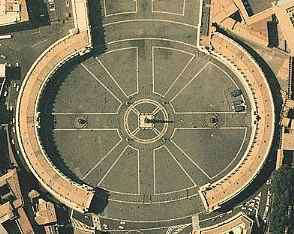
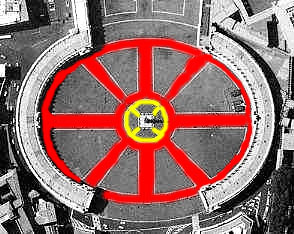
The obelisk is not a solitary remnant of ancient paganism found at the Vatican. Take a close look at the bird’s-eye view of St. Peter’s Square. The star of Ishtar is clearly visible stretching across the entire square, but look more closely at the center and you will see the 4-pointed symbol of the sun god, or Baal.
Baal or Adon (Adonai) was a phallic god. He was named Baal-Tzephon, or god of the crypt and Seth, or the pillar (phallus), because he was the same as Ammon (or Baal-Hammon) of Egypt, called ’the hidden god.’ Typhon, called Set, who was a great god in Egypt during the early dynasties, is an aspect of Baal and Ammon as also of Siva and other gods. Baal is the all devouring Sun, in one sense, the fiery Moloch. (Helena Blavatsky, The Theosophical Glossary)
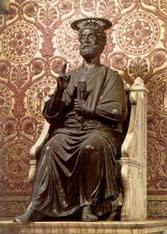 Inside St. Peter’s Cathedral stands a statue the church claims is a likeness of St. Peter, although the statue closely resembles the Roman deity Jupiter, hence the sun wheel on top of his head.
Inside St. Peter’s Cathedral stands a statue the church claims is a likeness of St. Peter, although the statue closely resembles the Roman deity Jupiter, hence the sun wheel on top of his head.
Jupiter (Latin) comes from the same root as the Greek Zeus, the greatest god of the ancient Greeks and Romans, adopted also by other nations. (Helena Blavatsky, The Theosophical Glossary)
While Catholics may believe Jesus Christ is (a) god, they don’t believe His death and resurrection paid the full penalty for sin; hence the doctrine of purgatory, which was first introduced by Semiramis in ancient Babylon.
The Chaldean Mysteries can be traced up to the days of Semiramis, who lived only a few centuries after the flood, and who is known to have impressed upon them the image of her own depraved and polluted mind. Ammianus Marcellinus compared with Justinus, Historia and Eusebius’ Chronicle. Eusebius says that Ninus and Semiramis reigned in the time of Abraham. That beautiful but abandoned queen of Babylon was not only herself a paragon of unbridled lust and licentiousness, but in the Mysteries which she had a chief hand in forming, she was worshipped as Rhea, the great ‘MOTHER’ of the gods, with such atrocious rites as identified her with Venus, the MOTHER of all impurity, and raised the very city where she had reigned to a bad eminence among the nations, as the grand seat at once of idolatry and consecrated prostitution. (Alexander Hislop, The Two Babylons)
The foundation of Catholic doctrine does not come from the word of God alone (Sola Scriptura) but also from honored church tradition (pagan idolatry). Catholic dogma relies heavily on the distorted interpretation of Christ’s conversation with Peter in Matthew 16:
When Jesus came into the coasts of Caesarea Philippi, he asked his disciples, saying, Whom do men say that I the Son of man am? And they said, Some say that thou art John the Baptist: some, Elias; and others, Jeremias, or one of the prophets. He saith unto them, But whom say ye that I am? And Simon Peter answered and said, Thou art the Christ, the Son of the living God. And Jesus answered and said unto him, Blessed art thou, Simon Barjona: for flesh and blood hath not revealed it unto thee, but my Father which is in heaven. And I say also unto thee, That thou art Peter, and upon this rock I will build my church; and the gates of hell shall not prevail against it. And I will give unto thee the keys of the kingdom of heaven: and whatsoever thou shalt bind on earth shall be bound in heaven: and whatsoever thou shalt loose on earth shall be loosed in heaven. (Matthew 16)
The Church twisted the meaning of this scripture to declare the church (specifically the Pope) the vicar (agent) of Christ. The church uses the ‘whatever you bind on earth shall have been bound in heaven’ to justify changing scripture and incorporating traditional doctrines, all in the name of Christ, as the church’s head - the Pope - is declared the infallible representative of Christ on earth. According to the Catechism of the Catholic Church (CCC):
The Pope, Bishop of Rome and Peter’s successor, ‘is the perpetual and visible source and foundation of the unity both of the bishops and of the whole company of the faithful.’ ‘For the Roman Pontiff, by reason of his office as Vicar of Christ, and as pastor of the entire Church has full, supreme, and universal power over the whole Church, a power which he can always exercise unhindered.’ (CCC 882)
It is the task of exegetes to work, according to these rules, towards a better understanding and explanation of the meaning of Sacred Scripture in order that their research may help the Church to form a firmer judgement. For, of course, all that has been said about the manner of interpreting Scripture is ultimately subject to the judgement of the Church which exercises the divinely conferred commission and ministry of watching over and interpreting the Word of God. (CCC 119)
Divine assistance is also given to the successors of the apostles, teaching in communion with the successor of Peter, and, in a particular way, to the bishop of Rome, pastor of the whole Church, when, without arriving at an infallible definition and without pronouncing in a ‘definitive manner,’ they propose in the exercise of the ordinary Magisterium a teaching that leads to better understanding of Revelation in matters of faith and morals. To this ordinary teaching the faithful ‘are to adhere to it with religious assent’ which, though distinct from the assent of faith, is nonetheless an extension of it. (CCC 892)
Jesus called these false Christs! According to the scriptures, the church of Jesus Christ has nothing to do with any building or religious institution.
Know ye not that ye are the temple of God, and that the Spirit of God dwelleth in you? (1 Corinthians 3)
Ye know that ye were Gentiles, carried away unto these dumb idols, even as ye were led. Wherefore I give you to understand, that no man speaking by the Spirit of God calleth Jesus accursed: and that no man can say that Jesus is the Lord, but by the Holy Ghost. Now there are diversities of gifts, but the same Spirit. And there are differences of administrations, but the same Lord. And there are diversities of operations, but it is the same God which worketh all in all. But the manifestation of the Spirit is given to every man to profit withal. For to one is given by the Spirit the word of wisdom; to another the word of knowledge by the same Spirit; To another faith by the same Spirit; to another the gifts of healing by the same Spirit; To another the working of miracles; to another prophecy; to another discerning of spirits; to another divers kinds of tongues; to another the interpretation of tongues: But all these worketh that one and the selfsame Spirit, dividing to every man severally as he will. For as the body is one, and hath many members, and all the members of that one body, being many, are one body: so also is Christ. For by one Spirit are we all baptized into one body, whether we be Jews or Gentiles, whether we be bond or free; and have been all made to drink into one Spirit. For the body is not one member, but many. If the foot shall say, Because I am not the hand, I am not of the body; is it therefore not of the body? And if the ear shall say, Because I am not the eye, I am not of the body; is it therefore not of the body? If the whole body were an eye, where were the hearing? If the whole were hearing, where were the smelling? But now hath God set the members every one of them in the body, as it hath pleased him. And if they were all one member, where were the body? But now are they many members, yet but one body. And the eye cannot say unto the hand, I have no need of thee: nor again the head to the feet, I have no need of you. Nay, much more those members of the body, which seem to be more feeble, are necessary: And those members of the body, which we think to be less honourable, upon these we bestow more abundant honour; and our uncomely parts have more abundant comeliness. For our comely parts have no need: but God hath tempered the body together, having given more abundant honour to that part which lacked. That there should be no schism in the body; but that the members should have the same care one for another. And whether one member suffer, all the members suffer with it; or one member be honoured, all the members rejoice with it. Now ye are the body of Christ, and members in particular. (1 Corinthians 12)
All scripture is given by inspiration of God, and is profitable for doctrine, for reproof, for correction, for instruction in righteousness: That the man of God may be perfect, thoroughly furnished unto all good works. (2 Timothy 3)
We have also a more sure word of prophecy; whereunto ye do well that ye take heed, as unto a light that shineth in a dark place, until the day dawn, and the day star arise in your hearts: Knowing this first, that no prophecy of the scripture is of any private interpretation. For the prophecy came not in old time by the will of man: but holy men of God spake as they were moved by the Holy Ghost. (2 Peter 1)
Why do thy disciples transgress the tradition of the elders? for they wash not their hands when they eat bread. But he answered and said unto them, Why do ye also transgress the commandment of God by your tradition? For God commanded, saying, Honour thy father and mother: and, He that curseth father or mother, let him die the death. But ye say, Whosoever shall say to his father or his mother, It is a gift, by whatsoever thou mightest be profited by me; And honour not his father or his mother, he shall be free. Thus have ye made the commandment of God of none effect by your tradition. Ye hypocrites, well did Esaias prophesy of you, saying, This people draweth nigh unto me with their mouth, and honoureth me with their lips; but their heart is far from me. But in vain they do worship me, teaching for doctrines the commandments of men. (Matthew 15)
Some Catholic apologists may argue all that really matters is the message of salvation.
What shall we say then? That the Gentiles, which followed not after righteousness, have attained to righteousness, even the righteousness which is of faith. But Israel, which followed after the law of righteousness, hath not attained to the law of righteousness. Wherefore? Because they sought it not by faith, but as it were by the works of the law. For they stumbled at that stumblingstone. (Romans 9)
For by grace are ye saved through faith; and that not of yourselves: it is the gift of God: Not of works, lest any man should boast. (Ephesians 2)
But Peter said unto him, Thy money perish with thee, because thou hast thought that the gift of God may be purchased with money. Thou hast neither part nor lot in this matter: for thy heart is not right in the sight of God. (Acts 8)
For the wages of sin is death; but the gift of God is eternal life through Jesus Christ our Lord. (Romans 6)
And this is life eternal, that they might know thee the only true God, and Jesus Christ, whom thou hast sent. (John 17)
Scripture repeatedly tells us our redemption from sin is a gift from God that cannot be earned. This gift of God is perfectly explained in John chapter 3:
For God so loved the world, that he gave his only begotten Son, that whosoever believeth in him should not perish, but have everlasting life. For God sent not his Son into the world to condemn the world; but that the world through him might be saved. He that believeth on him is not condemned: but he that believeth not is condemned already, because he hath not believed in the name of the only begotten Son of God. And this is the condemnation, that light is come into the world, and men loved darkness rather than light, because their deeds were evil. For every one that doeth evil hateth the light, neither cometh to the light, lest his deeds should be reproved. But he that doeth truth cometh to the light, that his deeds may be made manifest, that they are wrought in God.
He that cometh from above is above all: he that is of the earth is earthly, and speaketh of the earth: he that cometh from heaven is above all. And what he hath seen and heard, that he testifieth; and no man receiveth his testimony. He that hath received his testimony hath set to his seal that God is true. For he whom God hath sent speaketh the words of God: for God giveth not the Spirit by measure unto him. The Father loveth the Son, and hath given all things into his hand. He that believeth on the Son hath everlasting life: and he that believeth not the Son shall not see life; but the wrath of God abideth on him. (John 3)
After this, Jesus knowing that all things were now accomplished, that the scripture might be fulfilled, saith, I thirst. Now there was set a vessel full of vinegar: and they filled a spunge with vinegar, and put it upon hyssop, and put it to his mouth. When Jesus therefore had received the vinegar, he said, It is finished: and he bowed his head, and gave up the ghost. (John 19)
The Catechism of the Catholic Church teaches God’s grace and salvation is granted through the Catholic Church and its seven sacraments:
The Roman Church’s teachings concerning these sacraments derive from either a distorted interpretation of scripture, pagan tradition or a combination of the two. Roman Church is demonstrates through these ritual sacraments that Christ’s work is not finished, but that the (‘in place of’) path to salvation requires allegiance to the Church.
All salvation comes from Christ the Head through the Church which is his Body: Basing itself on Scripture and Tradition, the Council teaches that the Church, a pilgrim now on earth, is necessary for salvation: the one Christ is the mediator and the way of salvation; he is present to us in his body which is the Church. He himself explicitly asserted the necessity of faith and Baptism, and thereby affirmed at the same time the necessity of the Church which men enter through Baptism as through a door. Hence they could not be saved who, knowing that the Catholic Church was founded as necessary by God through Christ, would refuse either to enter it or to remain in it. (CCC 846)
Since the initiative belongs to God in the order of grace, no one can merit the initial grace of forgiveness and justification, at the beginning of conversion. Moved by the Holy Spirit and by charity, we can then merit for ourselves and for others the graces needed for our sanctification, for the increase of grace and charity, and for the attainment of eternal life. Even temporal goods like health and friendship can be merited in accordance with God’s wisdom. These graces and goods are the object of Christian prayer. Prayer attends to the grace we need for meritorious actions. (CCC 2010)
The Church affirms that for believers the sacraments of the New Covenant are necessary for salvation. ‘Sacramental grace’ is the grace of the Holy Spirit, given by Christ and proper to each sacrament. The Spirit heals and transforms those who receive him by conforming them to the Son of God. The fruit of the sacramental life is that the Spirit of adoption makes the faithful partakers in the divine nature by uniting them in a living union with the only Son, the Savior. (CCC 1129)
Christ instituted the sacrament of Penance for all sinful members of his Church: above all for those who, since Baptism, have fallen into grave sin, and have thus lost their baptismal grace and wounded ecclesial communion. It is to them that the sacrament of Penance offers a new possibility to convert and to recover the grace of justification. The Fathers of the Church present this sacrament as ‘the second plank [of salvation] after the shipwreck which is the loss of grace.’ (CCC 1446)
Compare the above statements from the Catechism of the Catholic Church with the following excerpt from Paul’s letter to the Romans:
And we know that all things work together for good to them that love God, to them who are the called according to his purpose. For whom he did foreknow, he also did predestinate to be conformed to the image of his Son, that he might be the firstborn among many brethren. Moreover whom he did predestinate, them he also called: and whom he called, them he also justified: and whom he justified, them he also glorified. What shall we then say to these things? If God be for us, who can be against us? He that spared not his own Son, but delivered him up for us all, how shall he not with him also freely give us all things? Who shall lay any thing to the charge of God’s elect? It is God that justifieth. Who is he that condemneth? It is Christ that died, yea rather, that is risen again, who is even at the right hand of God, who also maketh intercession for us. Who shall separate us from the love of Christ? shall tribulation, or distress, or persecution, or famine, or nakedness, or peril, or sword? As it is written, For thy sake we are killed all the day long; we are accounted as sheep for the slaughter. Nay, in all these things we are more than conquerors through him that loved us. For I am persuaded, that neither death, nor life, nor angels, nor principalities, nor powers, nor things present, nor things to come, Nor height, nor depth, nor any other creature, shall be able to separate us from the love of God, which is in Christ Jesus our Lord. (Romans 8)
Are you noticing the glaring contradictions yet? Catholic doctrine attempts to abolish the sacrifice that Jesus made on the cross.
By the which will we are sanctified through the offering of the body of Jesus Christ once for all. And every priest standeth daily ministering and offering oftentimes the same sacrifices, which can never take away sins: But this man, after he had offered one sacrifice for sins for ever, sat down on the right hand of God; From henceforth expecting till his enemies be made his footstool. For by one offering he hath perfected for ever them that are sanctified. Whereof the Holy Ghost also is a witness to us: for after that he had said before, This is the covenant that I will make with them after those days, saith the Lord, I will put my laws into their hearts, and in their minds will I write them; And their sins and iniquities will I remember no more. Now where remission of these is, there is no more offering for sin. (Hebrews 10)